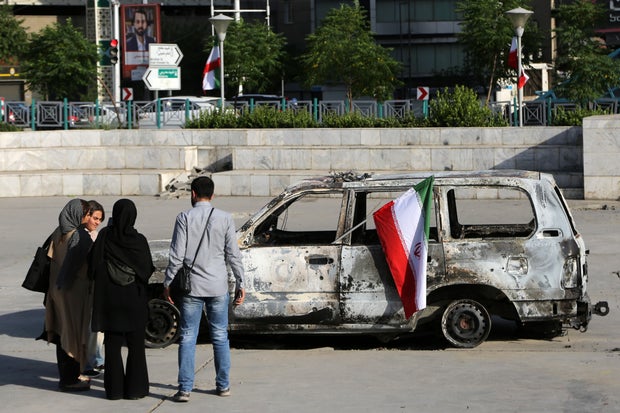Iranian insider acknowledges country weakened, but insists Iranians remain united against Israel
Unity and strength are the official lines coming from Iran‘s theocratic government in the face of President Trump’s demand for “unconditional surrender” and the possibility that he could order the U.S. military to join Israel’s attacks on the Islamic Republic’s nuclear facilities.
Israel’s daily, nearly weeklong bombardment of Iran’s nuclear and missile sites, and its assassinations of top commanders and senior scientists, have compounded the dilemma for Iran’s leaders — especially as they face the potential of internal unrest from a population under attack.
At least 639 Iranians have been killed and more than 1,300 wounded over the past six days, according to the Washington-based Human Rights Activists in Iran organization, which relies on a network of contacts in the country. Tens of thousands of Tehran’s roughly 10 million residents have now fled the capital, and other cities have also emptied out to some degree, with many people seeking safer spaces in the countryside.
But Iran’s ruling Muslim clerics and their adherents don’t talk about an exodus. Instead, they project solidarity, and even mock President Trump and his ultimatums.
“I just laugh at how negligent he is,” Hamidreza Gholamzadeh, director of the Iranian think tank Diplo House, told CBS News in a remote interview from Tehran on Thursday. “He does not know anything about Iranians, either in history, or the characteristics of the Iranian nation.”
“Even Iranian dissident figures are now pro-Iran,” he claimed, “because they know it is about [maintaining] the integrity of Iran, the whole being of Iran.”
Fatemeh Bahrami/Anadolu/Getty
But after a week of bruising attacks by Israel, and with the threat of more to come and even possible direct U.S. intervention looming on the horizon, the optimism and bluster may be getting harder to maintain.
“Let’s say, the power of Iran in the region has been weakened. It’s not something that you can deny,” acknowledged Gholamzadeh. “But the government itself has not been weakened at all. The Iranians are very united right now. The social cohesion is very strong right now.”
At most, Gholamzadeh claimed 20% of all Iranians would be happy to see their government fall.
“There might be 10% to 15% who are against the state, but not all of them would be participating in any activities” against the regime, he said, suggesting only 5% of Iranians would actually come out onto the streets “to actively participate.”
But recent surveys conducted before the current war, by independent organizations based outside Iran, found quite the opposite.
In 2023, following mass anti-government protests sparked the previous year by the death of 22-year-old Mahsa Amini in religious police custody, a survey by the Netherlands-based Group for Analyzing and Measuring Attitudes in Iran found that 81% of the country’s residents were against the cleric-led Iranian regime.
The 2022 anti-government protests were quashed, brutally, and nothing like them has been seen in Iran since. Censorship is rife, and Iran’s government has significantly curbed internet access over the last week, citing cyberthreats.
Gholamzadeh repeated warnings issued by Iran’s leaders, against the U.S. becoming actively involved in the conflict.
“Americans have a lot of military bases in different countries here in the region,” he noted, calling them “very easy targets.”
President Trump has warned repeatedly that any Iranian attack on American assets in the Middle East would be met with a swift response.






